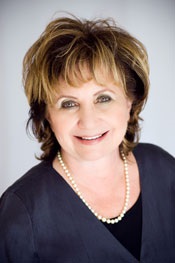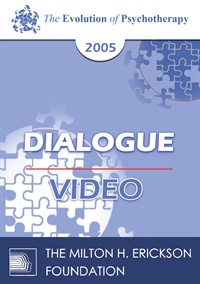EP05 Dialogue 09 - Spirituality - Cloe Madanes and Jean Houston, PhD
- Average Rating:
- Not yet rated
- Topic Areas:
- Dialogues | Meditation, Spirituality and Yoga | Psychotherapy | Family Systems | Cultural and Social Contexts
- Categories:
- Evolution of Psychotherapy | Evolution of Psychotherapy 2005 | Pioneers in Couples and Family Therapy
- Faculty:
- Cloe Madanes, HDL, LIC | Jean Houston, PhD
- Course Levels:
- Master Degree or Higher in Health-Related Field
- Duration:
- 1:04:28
- Format:
- Audio and Video
- Original Program Date:
- Dec 09, 2005
- License:
- Never Expires.
Description
Description: This session focuses on integrating spirituality into psychotherapy to promote healing and prevent violence. Madanes and Houston discuss the use of practices like yoga, meditation, and gratitude for spiritual growth, and a treatment model for juvenile sex offenders that combines family involvement, apologies, and reflection...achieving a 98% success rate. They also address spiritual development and the role of social justice in therapeutic work.
Moderated by Bernhard Trenkle, Dipl. Psych.
Educational Objectives:
- Given a topic, to describe the differing approaches to psychotherapy, and to identify the strengths and weaknesses in each approach.
*Sessions may be edited for content and to preserve confidentiality*
Credits
Handouts
| Timestamped Transcript (762.3 KB) | 17 Pages | Available after Purchase |
Faculty

Cloe Madanes, HDL, LIC Related Seminars and Products
Cloé Madanes, HDL, LIC, is a world-renowned innovator and teacher of family and strategic therapy and one of the originators of the strategic approach to family therapy. She has authored seven books that are classics in the field: Strategic Family Therapy; Behind the One-Way Mirror; Sex, Love and Violence; The Violence of Men; The Secret Meaning of Money; The Therapist as Humanist, Social Activist and Systemic Thinker; and Relationship Breakthrough. She has presented her work at professional conferences all over the world and has given keynote addresses for The Evolution of Psychotherapy Conference, the American Association of Marriage and Family Therapy; the National Association of Social Workers, The Erickson Foundation, the California Psychological Association and many other national and international conferences. Madanes has won several awards for distinguished contribution to psychology and has counseled outstanding individuals from all walks of life.

Jean Houston, PhD Related Seminars and Products
Jean Houston, Ph.D in Psychology, is the author of over 30 books in the fields of human and social development. As a consultant to UN programs and other international agencies she has worked in some 109 countries, and continues to advise globally in social artistry (human development in the light of social challenge and change). Jean is also Chancellor of Meridian University, Co-Founder of Rising Women, Rising World.


